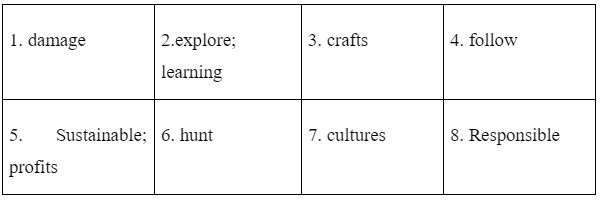Vocabulary - Unit 10: Ecotourism - SBT Tiếng Anh 10 Global Success1. Choose the correct word to complete each sentence. 2. Complete these sentences by filling in each blank with ONE word in the box. There is ONE extra word you will not need.3. Choose the best answers to complete the sentences. Tổng hợp đề thi học kì 2 lớp 10 tất cả các môn - Kết nối tri thức Toán - Văn - Anh - Lí - Hóa - Sinh - Sử - Địa...
Lựa chọn câu để xem lời giải nhanh hơn
II. Vocabulary Câu 1: (Bài 1) 1. Choose the correct word to complete each sentence. (Chọn từ đúng để hoàn thành mỗi câu.) 1. Many tourists damage / reduce the environment when they are travelling. 2. When ecotourists explore / discover a place, they often enjoy learning / talking about the culture there. 3. One way to help the local community is to buy local arts and parts / crafts. 4. Please go / follow walking paths and trails when you go hiking. 5. Sustainable / Mass tourism helps people keep benefits / profits local. 6. Tourists should not follow / hunt wild animals to protect the local environment. 7. Ecotourists respect the local businesses / cultures by learning about the customs and traditions of the places they visit. 8. Aware / Responsible tourists will avoid damaging the environment when they travel. Lời giải chi tiết:
1.Many tourists damage the environment when they are travelling. (Nhiều du khách làm hại môi trường khi họ đang đi du lịch.) Giải thích: damage (v): làm hư hại reduce (v): giảm 2.When ecotourists explore a place, they often enjoy learning about the culture there. (Khi các nhà du lịch sinh thái khám phá một địa điểm, họ thường thích tìm hiểu về văn hóa ở đó.) Giải thích: explore (v): khám phá discover (v): phát hiện learning (v): học tập talking (v): nói chuyện 3.One way to help the local community is to buy local arts and crafts. (Một cách để giúp đỡ cộng đồng địa phương là mua các tác phẩm thủ công và mĩ nghệ của địa phương.) Giải thích: parts (n): phần crafts (n): đồ thủ công Cụm từ: arts and crafts: đồ thủ công và mĩ nghệ 4.Please follow walking paths and trails when you go hiking. (Vui lòng đi theo các con đường đi bộ và đường mòn khi bạn đi bộ đường dài.) Giải thích: go (v): đi follow (v): đi theo 5.Sustainable tourism helps people keep profits local. (Du lịch bền vững giúp mọi người giữ lợi nhuận tại chỗ.) Giải thích: Sustainable (adj): bền vững Mass (adj): số đông benefits (n): lợi ích profits (n): lợi nhuận 6.Tourists should not hunt wild animals to protect the local environment. (Khách du lịch không nên săn bắt động vật hoang dã để bảo vệ môi trường địa phương.) Giải thích: follow (v): đi theo hunt (v): săn bắn 7.Ecotourists respect the local cultures by learning about the customs and traditions of the places they visit. (Người du lịch sinh thái tôn trọng văn hóa địa phương bằng cách tìm hiểu về phong tục và truyền thống của những nơi họ đến thăm.) Giải thích: businesses (n): việc kinh doanh cultures (n): nền văn hóa 8.Responsible tourists will avoid damaging the environment when they travel. (Khách du lịch có trách nhiệm sẽ tránh làm tổn hại đến môi trường khi họ đi du lịch.) Giải thích: Aware (adj): nhận thức Responsible (adj): có tinh thần trách nhiệm II. Vocabulary Câu 2: (Bài 2) 2. Complete these sentences by filling in each blank with ONE word in the box. There is ONE extra word you will not need. (Hoàn thành các câu sau bằng cách điền vào mỗi chỗ trống MỘT từ trong hộp. Có MỘT từ bổ sung mà bạn sẽ không cần.) aware impact litter responsible for on of (x2) to 1. Everyone is (1) _________(2) _________ protecting the environment. 2. Tourists should be (3) _________(4) _________ the possible damage that travel may cause to the environment. 3. The (5) _________ (6) _________ tourism on the local crea could be both positive and negative. 4. Many tourists throw (7) _________ (8) _________the streets. Lời giải chi tiết:
1.Everyone is (1) responsible(2) for protecting the environment. (Mọi người đều có trách nhiệm bảo vệ môi trường.) Giải thích: Cụm từ: responsible for: có trách nhiệm với 2.Tourists should be (3) aware(4) of the possible damage that travel may cause to the environment. (Khách du lịch nên nhận thức về những thiệt hại có thể xảy ra mà việc du lịch có thể gây ra cho môi trường.) Giải thích: Cụm từ: aware of: nhận thức về 3.The (5) impact(6) of tourism on the local crea could be both positive and negative. (Tác động của du lịch đối với khu vực địa phương có thể là cả tích cực và tiêu cực.) Giải thích: Cụm từ: impact of: tác động đến 4.Many tourists throw (7) litter(8) on the streets. (Nhiều du khách vứt rác bừa bãi trên đường phố.) II. Vocabulary Câu 3: (Bài 3) 3. Choose the best answers to complete the sentences. (Chọn các câu trả lời đúng nhất để hoàn thành các câu.) 1. There are many things for tourists to ________ on the island. A. explore B. explain C. explode D. expand 2. Avoid ________ water when you take a bath. A. washing B. waiting C. wasting D. waking 3. There is a ________ market along this river. A. flowing B. swimming C. floating D. boating 4. ________ tourism has a lot of negative impact on the environment. A. Mass B. Massive C. Eco- D. Eco-friendly 5. We followed a ________ in the forest. A. way B. trail C. road D. street 6. Are you ________ of the importance of protecting the environment? A. interested B. aware C. fond D. responsible 7. There is a ________ for you to walk along the coast. A. street B. highway C. path D. driveway 8. ________ people are very friendly and welcoming to the tourists. A. Home B. Inside C. Foreign D. Local Lời giải chi tiết:
1. A There are many things for tourists to explore on the island. (Có rất nhiều điều để du khách khám phá trên đảo.) A. explore (v): khám phá B. explain (v): giải thích C. explode (v): phát nổ D. expand (v): mở rộng 2. C Avoid wasting water when you take a bath. ( Tránh rửa nước khi bạn đi tắm.) A. washing (n): rửa B. waiting (n): chờ đợi C. wasting (n): lãng phí D. waking (n): đi dạo 3. C There is a floating market along this river. (Có một chợ nổi dọc theo con sông này.) A. flowing (adj): chảy B. swimming (n): bơi lội C. floating (adj): nổi D. boating (n): chèo thuyền 4. A Mass tourism has a lot of negative impact on the environment. (Số đông du lịch có nhiều tác động tiêu cực đến môi trường.) A. Mass (adj): số đông B. Massive (adj): to lớn C. Eco- (adj): sinh thái D. Eco-friendly: thân thiện với môi trường 5. B We followed a trail in the forest. (Chúng tôi đi theo một con đường mòn trong rừng.) A. way (n): đường đi B. trail (n): đường mòn C. road (n): đường bộ D. street (n): đường phố 6. B Are you aware of the importance of protecting the environment? (Bạn có nhận thức được tầm quan trọng của việc bảo vệ môi trường?) A. interested (+ in): quan tâm đến cái gì B. aware (+ of): nhận thức C. fond (+ of): thích D. responsible (+ for): có trách nhiệm với 7. C There is a path for you to walk along the coast. (Có một con đường để bạn đi bộ dọc theo bờ biển.) A. street (n): đường phố B. highway (n): đại lộ C. path (n): đường dẫn D. driveway (n): đường lái xe 8. D Local people are very friendly and welcoming to the tourists. (Người dân địa phương rất thân thiện và chào đón khách du lịch.) A. Home (n): nhà B. Inside (n): nội bộ C. Foreign (adj): ngoại quốc D. Local (adj): địa phương
>> 2K9 Học trực tuyến - Định hướng luyện thi TN THPT, ĐGNL, ĐGTD ngay từ lớp 11 (Click để xem ngay) cùng thầy cô giáo giỏi trên Tuyensinh247.com. Bứt phá điểm 9,10 chỉ sau 3 tháng, tiếp cận sớm các kì thi.
|
























